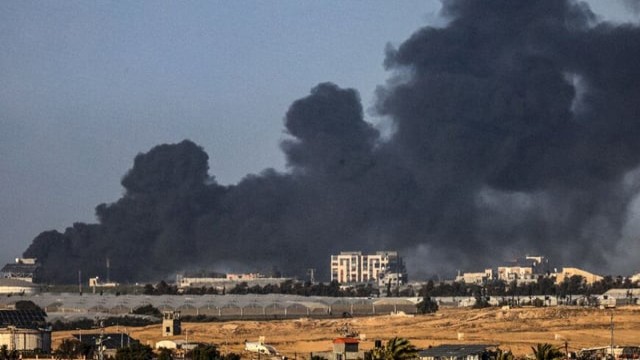Intense violence was being avoided by Palestinians in southern Gaza, where communications were once more disrupted on Monday. Israel was under increasing pressure to find a solution that would grant the long-desired statehood to the Palestinian people.
Mahdi Antar, 21, took sanctuary at the Al-Nasser hospital in Khan Yunis, the main southern city of Gaza that has turned into the epicenter of the four-month-long conflict between Israeli forces and Hamas.
"It's a terrible situation. It's really tough tonight and today—there are bombs and shootings. "I'm not sure what to do," he murmured.
Over 120 individuals had died in the last 24 hours, according to a Monday report from the Gaza Strip's health ministry, which is controlled by Hamas.
As AFP journalists witnessed, victims of the most recent Israeli attacks were taken to Al-Nasser hospital, and mourners interred the remains in a mass grave.
Based on official Israeli numbers, an AFP count indicates that 1,140 persons in Israel lost their lives as a result of Hamas's unprecedented October 7 strikes, which marked the start of the conflict. The majority of the victims were civilians.
In retaliation, Israel launched an unrelenting attack in Gaza that, according to the health ministry there, has killed at least 25,295 people, with almost 70% of those murdered being women, children, and teenagers.
Three more Israeli troops have died since ground operations in Gaza began in late October, bringing the total to 198.
This includes, according to an AFP count based on Israeli statistics, the bodies of at least 28 slain captives.
On Monday, supporters of the prisoners' release who have staged frequent demonstrations calling on the Israeli government to act to release them were seen storming a hearing of a parliamentary committee.
Gilad Korngold, the father of hostage Tal Shoham, exclaimed, "You sit here while our children are dying over there," according to an AFP correspondent.
For the tenth time since the start of the conflict, telecoms provider Paltel reported that services in Gaza were suspended on Monday "due to the ongoing and escalating aggression".
- 'Other solutions?' -
New attacks on Gaza's southern region occurred concurrently with meetings between European foreign ministers and senior diplomats from major Arab states and the fighting factions in Brussels.
Josep Borrell, the head of EU foreign policy, said to Israel that "peace and stability cannot be built only by military means."
"What other remedies do they have in mind? to force all Palestinians to flee? to eradicate them?"
Borrell stated that addressing the humanitarian crisis must come first since adding to Gazan suffering will neither weaken Hamas nor improve Israel's security.
By rejecting proposals for a Palestinian state, Israeli Prime Minister Benjamin Netanyahu has rejected the US, which gives Israel billions of dollars in military aid, and come under fire from the UN.
About 250 captives were taken during the Hamas attack, and according to Israel, about 132 are still in Gaza.
Riyad al-Maliki, the chief diplomat for the Palestinian Authority, urged the European Union to consider imposing penalties on Netanyahu for "destroying the chances for a two-state solution" and demanded that an urgent ceasefire be called.
According to Jordan's Foreign Minister Ayman Safadi, "the only way out of this misery" is a two-state solution that "the whole world" views.
Israel Katz, the country's chief diplomat, told reporters that his government was only concerned with freeing the captives and protecting its own security, ignoring their inquiries about a potential two-state solution.
The war has sparked worries about a larger escalation due to an increase in violence in the region involving friends of Hamas that are backed by Iran.
The Huthi rebels in Yemen claimed to have fired missiles against a US Navy ship in the Gulf of Aden, close to the Red Sea; however, an American defense official denied any assault had occurred.
Concerns about the increasing likelihood of famine and disease taking more lives in Gaza than conflict have been raised by UN agencies and humanitarian organizations.
- 'Heading to the unknown' -
The Israeli siege and the ensuing severe shortages of gasoline, food, water, and medicine are placing a heavy burden on the territory's health sector.
On Monday, the Palestinian Red Crescent Society made a plea to the international community to safeguard its employees and assets, especially its main office and the Al-Amal hospital located in Khan Yunis.
Since the start of the conflict, 12,000 vehicles carrying 1,052 tons of medical supplies have reportedly entered Gaza, according to the Israeli army.
On a visit to Israel, French Defense Minister Sebastien Lecornu expressed optimism to AFP that "every hostage" will receive the medications that were sent to Gaza last week as part of an agreement mediated by France and Qatar.
According to UN organization for Palestinian refugees, 1.7 million Gazans have been forced to flee their homes due to the war.
With his possessions heaped onto a cart pulled by a donkey, Abu Iyad informed AFP that he was moving for the sixth time.
He was leaving Khan Yunis for Rafah, which is close to the Egyptian border and is home to hundreds of thousands of Palestinian refugees, many of whom are living in improvised tents.
"I'm going somewhere unknown," he declared.
"Where should we go in Rafah, as they instructed us to go? Is there still room?"
End//voice7news.tv





























Comment: